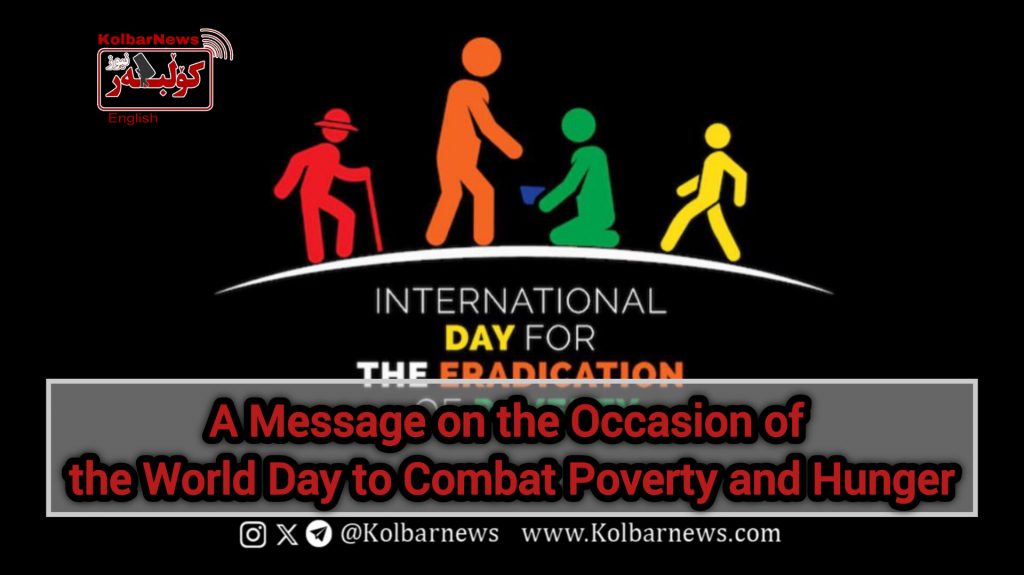
Thursday, October 17, 2024, is the World Day to Combat Hunger. It has been over half a century since this day was designated. Every year, shocking statistics are released around this time. Those responsible for this disastrous situation announce long-term plans to eradicate this massive catastrophe. When it became clear in 2008 that over 832 million people worldwide were not getting enough to eat, numerous summits were held, and participants pledged to halve this number by 2015 and end it by 2030. However, when the United Nations’ Food and Agriculture Organization (FAO) announced in 2016 that 815 million people were still not receiving adequate nutrition, the failure of these commitments became evident.
The statistics are too stark to ignore. It is estimated that if no solution is found to prevent environmental destruction, agricultural production could decrease by 5 to 30 percent by 2030, pushing nearly 100 million more people into poverty.
Current statistics show that one in nine people globally goes to bed hungry every night. Deaths from hunger outnumber deaths from the combined toll of COVID-19, AIDS, malaria, and tuberculosis. More than 160 million children under the age of five worldwide are stunted because they do not receive adequate nutrition. Half of these children live in Asia, and a third live in Africa. Half of the six million children who die annually do so because of inadequate nutrition.
According to Oxfam, a non-governmental organization, eight of the world’s richest individuals hold more wealth than 50% of the global population. The World Food Programme has stated that it would only take 2 cents a day from this wealth to provide a meal with the necessary vitamins to schoolchildren suffering from malnutrition.
It has been eight years since countries committed to ending hunger by 2030 as part of the Sustainable Development Goals, yet no significant steps have been taken to achieve this. The number of hungry people, which began rising in 2017, continues to grow.
According to the 2023 report “The State of Food Security and Nutrition in the World” published by FAO, 735 million people faced hunger in 2022—roughly one in ten people globally—marking an increase of 122 million since 2019 (before the COVID-19 pandemic). If this trend continues, it is estimated that by 2030, more than 840 million people will face hunger. Currently, Asia has the largest number of hungry people globally, but hunger is spreading fastest in Africa, and it is estimated that within the next decade, Africa will host half of the world’s hungry population.
According to manipulated official statistics from Iran’s Statistical Center, over the past decade, the purchasing power of the population has decreased by at least one-third. In 2011, 20% of the population lived below the poverty line, and by 2021, this figure had risen to 31%, meaning one-third of Iran’s population was below the poverty line. Now, in 2023, more than 70% of Iranians live four to five times below the poverty line. This situation has led to various social problems, including prostitution, drug addiction, waste picking, homelessness, child labor, suicide, and more.
Extreme poverty and exploitation imposed on working-class and impoverished families result in constant mental pressure. Despite the labor of all family members, from children to adults, they struggle to meet basic living needs. Having leisure time is impossible for them, and contemplating solutions to change their fate is met with countless obstacles. Their family and individual stability is in constant jeopardy. As a result, engaging in political or social matters and fighting for human and democratic rights becomes difficult. Gaining political and class awareness and organizing alongside their fellow class members becomes a challenge. When they find no solutions on earth, they may turn to religious opiates, seeking justice in the afterlife. This is precisely what capitalists and their governments, and in Iran, the Islamic Republic, desire.
The reality is that capitalist solutions to end this enormous human catastrophe will do nothing but maintain the status quo. If an end is to be found to this situation, it will only be achieved through the struggle to overthrow the system that produces poverty and hunger as one of its outcomes. The fight to overthrow the Islamic Republic is a struggle to lift 70% of society out of poverty, unemployment, deprivation, homelessness, inflation, and numerous other social problems, both large and small.

